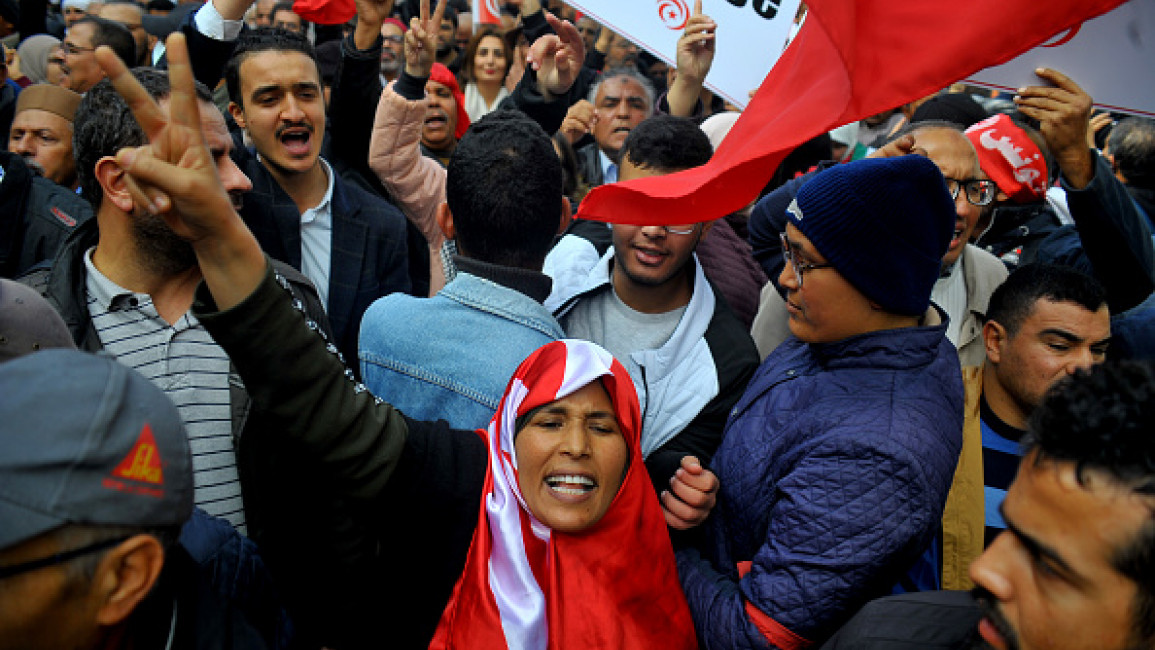Tunisians protest Saied's rule on anniversary of revolution
Thousands of protesters took to the streets of Tunis on Saturday, facing down a massive security presence to march against the increasingly autocratic rule of President Kais Saied on the anniversary of the Tunisian revolution twelve years ago.
On 14 January 2011, after weeks of unprecedented protests followed the self-immolation of street vendor Mohamed Bouazizi, longtime President Zine el Abidine Ben Ali finally left the country, marking a key moment on the country’s path to democratic rule.
All major roads and alleyways to Habib Bourguiba Avenue in Tunis were blocked off by security forces early on Saturday morning, in anticipation of protests organised by a coalition of opposition groups.
One of the largest demonstrations of the last 3 years in Tunisia -actually a few separate ones- is currently taking place in Habib Bourguiba Avenue, even though it's a windy day in Tunis.
— Youssef Cherif (@Faiyla) January 14, 2023
They may disagree on what comes after, but for now their main enemy is one: the President.
According to videos on social media and reporters in Tunis, thousands of protesters broke through several lines of police barricades within hours.
Habib Bourguiba Avenue, the traditional site for major demonstrations, became crowded with thousands of protesters waving Tunisian flags, amid chants of "the people demand the fall of the regime", a chant made universal by the popular uprisings of 2011 across the Arab world.
"We were on Bourguiba in January 2011 when Saied was not present... today he is closing Bourguiba to us. We will reach it whatever the price," said Chaima Issa, an activist who took part in the 2011 revolution before the crowd pushed through the barriers.
In front of Ministry of Interior now, police getting the water canon ready and telling the protesters to back off via speakers. pic.twitter.com/CJdwLicz30
— Ghaya Ben Mbarek غاية بن مبارك (@Ghaya_BM) January 14, 2023
Outside the Ministry of Interior, security forces began to prepare water cannons and ordered protestors to back away before they are deployed.
Outside the capital, blockades have been placed on all major highways to impede protestors from around the country joining the streets of Tunis.
Saied takes on revolutionary legacy
On the eve of the anniversary, President Kais Saied preempted Saturday’s protests by visiting Habib Bourghuiba street himself, inspecting security preparations and speaking to vendors in the old city of Tunis.
Saied has appeared increasingly on the streets of Tunis, meeting with locals in carefully coordinated interviews leading up to the anniversary of the revolution.
During his tour, Saied accused opposition politicians involved in Saturday’s protests of attempting to derail and subvert his political programme.
Saied dismissed Tunisia's former prime minister and suspended the democratically elected parliament in a July 2021 power grab.
Since then he has adopted an increasingly dictatorial style of rule, arresting political opponents and enacting a new constitution which rights groups have decried as "authoritarian".
Prior to Saied's move, Tunisia was considered one of the success stories of the Arab Spring.
In late 2022, the president ordered that Tunisians remember the ‘true date’ of the revolution as 17 December, when Bouazizi set fire to himself, instead of 14 January.
Saied has previously described 14 January as “the date of the abortion of the revolution”, as President Ben Ali was forced to flee.
Opposition political parties have accused the president of reversing the hard-fought democratic gains made since 2011.
Reuters contributed to this report



